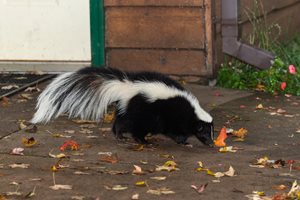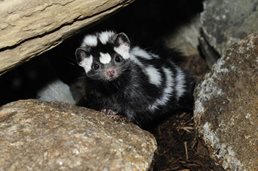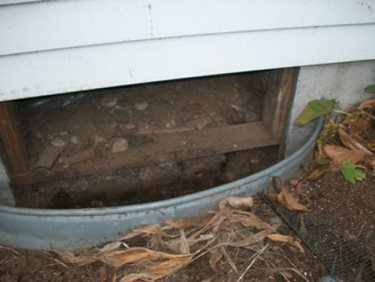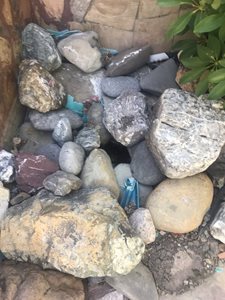Seeing skunks in your neighborhood or on your property may cause you to start asking questions like, “Why is there a skunk in my yard?” or “What attracts skunks to this location?” and, like everyone else, “How do I get rid of skunks?”
Another question is, “What does a skunk look like?” Skunks are easily identifiable with their black fur, white stripes, and bushy tails. They are about the size of a house cat and typically sleep during the day and become active after dark.
Skunks have basic survival needs that attract them to your yard. Keep reading to learn more about what they need to survive, the dangers of having a skunk in your yard, and how to get rid of them.
What Attracts Skunks to My Yard?
Skunks are attracted to residential neighborhoods because their survival depends on acquiring shelter, water, and food, each readily available in homes and backyards. Certain smells lure skunks to your property, such as rotting meats from leftovers in your trash. Steak, chicken, hot dogs, lunch meat, and other foods that produce a strong odor when decaying will attract skunks.
What Do Skunks Eat?

Skunks’ diets depend on availability and the season. They are omnivores and eat small mammals, including mice, rats, rabbits, moles, voles, and chicken eggs. In any season, they scavenge food scraps and pet and livestock feed. Skunks will eat any bird seed they can find, especially those that fall from a bird feeder in your yard. They will also steal from your garden if it is not protected.
The spring and summer seasons offer many food options, but a skunk’s diet primarily consists of insects, such as grasshoppers, bees, beetles, larvae, and crickets. One study analyzed the stomach contents of 414 skunks. They found 41.3% were insects, 22.1% were fruits and berries, 14.1% were mice, 12.9% were grains, and 22.5% were carrion, birds, and unidentified foods.
The skunk’s diet is less abundant in the fall and winter. It may include carrion, fruit, and seeds.
Skunks Look for Water
Skunks do not drink much water throughout the day. Food is their top concern. However, skunks strive to live no more than one to two miles from a water source. Water sources on your property or in your neighborhood that attract skunks include the following:
- Ponds of any size
- Swimming pools
- Bird baths or waterers
- Leaking garden hoses
- Leaky outdoor pipes or hydrants
- Condensation from air conditioning units
- Yard décor or unused items that hold rainwater
Stagnant water, livestock manure, compost piles, outdoor lights, and trash cans attract insects, which attract skunks. Yard clutter attracts mice and rats, which become a skunk’s prey.
Where Do Skunks Live?
Skunks find dens for nesting in various places. They typically take over abandoned or naturally formed spaces but will dig burrows if none exist. The main requirement for nesting is to be hidden, as they try to avoid encounters with humans and potential predators. Skunks also nest to stay warm, give birth, and raise their young.
Skunks often use multiple denning spots in the spring or summer. They give birth in late spring or early summer and will look for a den to birth their babies and then a different one to raise them. Skunks search for a den in fall and winter to stay warm until temperatures rise.
Each season, you may find a skunk sheltering in the following:

Natural skunk dens:
- In burrows
- Underwood or rock piles
- Under porches

Man-made skunk dens
- Under homes
- In basements or crawlspaces
- In culverts
- In drain pipes
- In rock crevices
What Signs Indicate Skunks Are in Your Yard?
Although skunks want to avoid human encounters, they leave obvious signs of activity in your yard.
- Small holes in your lawn are caused by skunks digging in the yard at night and searching for grubs and other insects.
- Skunk feces can be up to 1.5 inches in diameter and 2 inches long. They may contain their favorite foods, such as insects, nuts, and seeds.
- Overturned trash cans and scattered trash may be skunks—and not raccoons.
- Musty odors or skunk spray’s strong, foul aroma can take weeks to fade.
- Skunk noises include stomping, hissing, scratching, lip-smacking, squealing, etc.
Skunk Digging
Skunks know that grubs and other insects live under the grass in your lawn and the plants in your garden. During the summer and fall seasons, skunks can damage your landscape with their specific system for removing insects.
They first use their noses to find the perfect digging spot. They push the sod in with their nose and then use their claws to dig small, shallow holes that are three to four inches. A ring of loose soil usually surrounds the skunk holes in the yard.

What Are the Dangers of Skunks in Your Yard?
Skunks are most known for the awful-smelling liquid they spray when they feel threatened. They can spray up to 15 feet, so even if you think you are far enough away from them, you may not be. A skunk’s spray contains sulfuric acid. Indirect contact with the spray can cause nausea, and direct contact can cause vomiting and burning in your nose and eyes. Some people may experience respiratory issues.
Skunk spray is tough to eliminate. The smell can linger for days and weeks, even on pets that have been sprayed.
Additional skunk dangers include:
- Transmitting rabies, leptospirosis, canine hepatitis, distemper, intestinal roundworms, or tularemia through bites or scratches.
- Creating unstable foundations by burrowing under homes, sheds, or other buildings.
- Tripping on holes they dig in the yard.
How Do You Keep Skunks Out of Your Yard?
There are multiple strategies for deterring and preventing skunks in your yard. Some methods are easier than others, and some require the help of a professional. Because skunks search for food, water, and shelter, you must eliminate all possibilities on your property. Here are some tips you can start implementing today:
- Properly store trash in secure garbage cans.
- Put garbage cans in an area out of a skunk’s reach.
- Surround your garden with mesh wire that you bury at least one foot underground and three inches above the ground.
- Properly store pet and livestock feed.
- Don’t overfill bird feeders.
- Avoid throwing out food scraps in your yard.
- Enclose open spaces under decks and porches and secure openings to basements and crawlspaces.
- Remove wood and rock piles and clutter in your yard.
Most importantly, implement as many exclusions as possible, making your yard and home unattractive to skunks and their many prey. Hiring professionals to help with exclusion services is highly recommended. They are experts in keeping skunks away and getting them to leave.
How Do You Get Rid of Skunks?
If you see a skunk in your yard, you have DIY and professional options to consider. If you can locate their den, try blocking the entrance when they are out at night, forcing them to look for shelter elsewhere. You can also try using strong smells, loud noises, and bright lights to make them uncomfortable enough to want to leave. You may also try homemade and commercial skunk repellents.
Because some methods to get a skunk to leave can pose a risk, contact a professional to do the job. They have safe and humane methods that work, including trapping, repellents, and exclusions.
Can You Use Skunk Repellents?
Some skunk repellents are easy and safe, like placing used kitty litter next to their nesting spot. Skunks will want to avoid the litter and likely move to another den. You can also try rags soaked in ammonia or mothballs, both of which have strong smells.
You may have been told to try predator urine, cayenne pepper, or castor oil as repellents. However, they are not highly effective and may even harm children and pets if they are found and handled.
Some homeowners try placing bright lights in the opening of a skunk’s den. This technique may work best in winter, but the light may attract insects in summer, giving skunks a reason to stay. Others place a radio in the den to scare skunks away. If this works, it usually only works during the daytime when skunks try to sleep.
How Do Professional Skunk Removal Services Work?
Professional skunk removal services protect you and the skunk from harm. They have tools and equipment for humane removal and know the laws regarding relocating the animal and testing it for diseases.
When you contact the experts, like those at Critter Control, you receive a thorough inspection of your property and identification of all possible skunk dens and signs of activity. They can point out the damages a skunk caused and recommend repairs. Professionals can implement numerous exclusions to prevent future visits from skunks.
Contact the Critter Control experts if you suspect a skunk is living on your property. They have extensive training and skunk removal experience and can quickly and effectively eliminate your skunk problem.
Call them at 1-800-274-8837 or contact them online today.